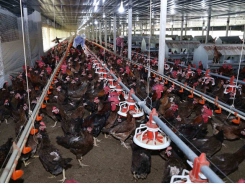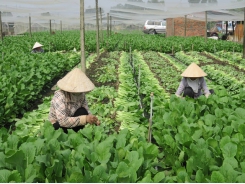Coffee price slides, farmers and merchants incur losses

The downward trend in coffee prices are affecting farmers and traders. The price hovered around VND48 million per ton at the beginning of 2017 and dropped to VND38 million one year later.
However, the price levels were still higher than the VND30-31 million level seen in the first half of April this year. It appears that the price is sliding to the 2016 level and the 3-year cycle is repeating.
Coffee price slides, farmers and merchants incur losses
Reports show a steady decrease in coffee prices since 2017. The export prices were $2,249 per ton and $1,883 in 2017 and 2018, respectively, a decrease of 16.3 percent. The price decreased by 7.6 percent further in the first three months of 2019 to $1,739.
“Most coffee trading companies like mine said they only made profit one out of the last five years and took a loss the other four years,” said Tran Ngoc Huy, owner of a coffee trading company in Pleiku City of Gia Lai province.
London Robusta futures prices rose from the bottom of $1,310 per ton in 2016 to $2,200 in 2017, but they have been sliding since then.
State agencies believe that if farmers have long term capital, they will be able to avoid losses by buying coffee beans when the price is low and selling when the price goes up.
However, Nguyen Quang Binh, an expert, in his article on Thoi Bao Kinh Te Sai Gon, doesn’t think capital is the key.
In the first quarter of 2019, Vietnam exported 477,000 tons of coffee, a decrease of 15.3 percent, and the export turnover was $830 million, a decrease of 24 percent compared with the same period last year. However, the price continued sliding.
Binh believes that storing coffee beans for sale when the price goes up is a short-term solution that works well only when demand is equal to or higher than supply.
Meanwhile, the International Coffee Organization (ICO) has predicted an oversupply of 3.06 million bags (60 kilograms per bag) with total output of 168.05 million bags.
Selling coffee under price-to-be-fixed contracts and storing goods are not good solutions, as methods may do more harm than good if the pricing trend is not good for sellers. While sellers expect price increases to fix selling prices, buyers believe the prices won’t go up.
The prices of the London Robusta futures market have fallen to a 3-year low, while New York Arabica has dropped to the lowest level of the last 13.5 years.
Financial investment funds in the world are also rushing to sell coffee in anticipation of further price decreases.
Có thể bạn quan tâm
Phần mềm

Phối trộn thức ăn chăn nuôi

Pha dung dịch thủy canh

Định mức cho tôm ăn

Phối trộn phân bón NPK

Xác định tỷ lệ tôm sống

Chuyển đổi đơn vị phân bón

Xác định công suất sục khí

Chuyển đổi đơn vị tôm

Tính diện tích nhà kính

Tính thể tích ao hồ



 Price plunge dashes rubber farmers ‘white gold’ dream
Price plunge dashes rubber farmers ‘white gold’ dream  Private enterprises as centerpiece for Vietnam’s agricultural development
Private enterprises as centerpiece for Vietnam’s agricultural development